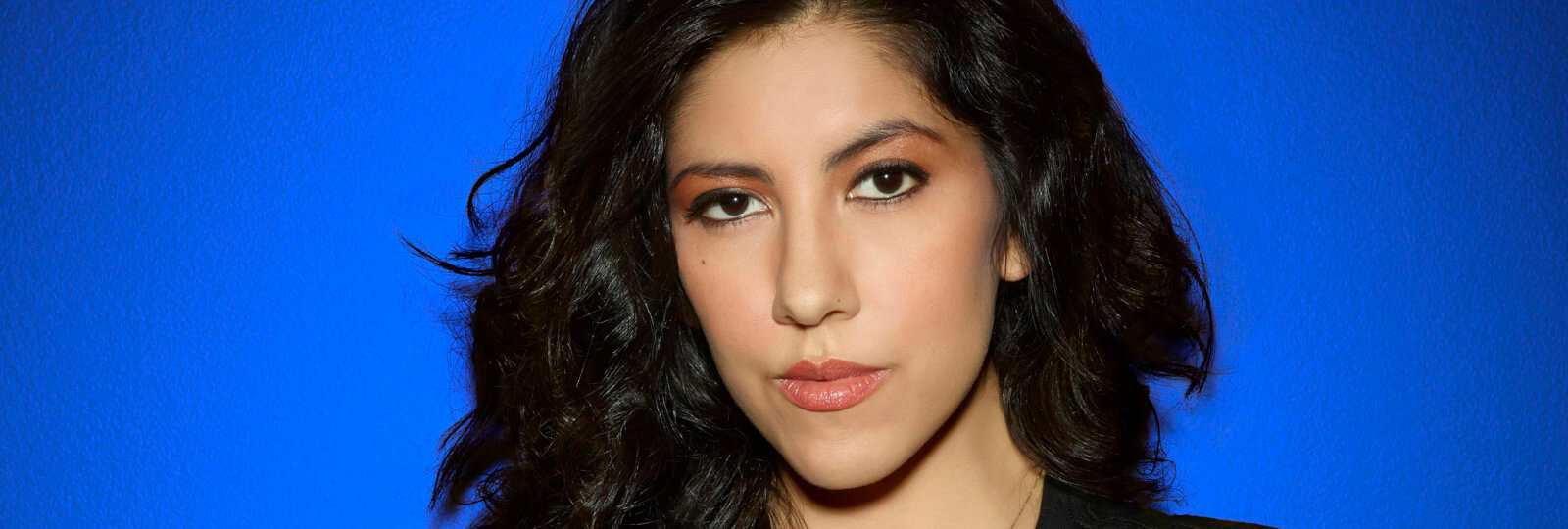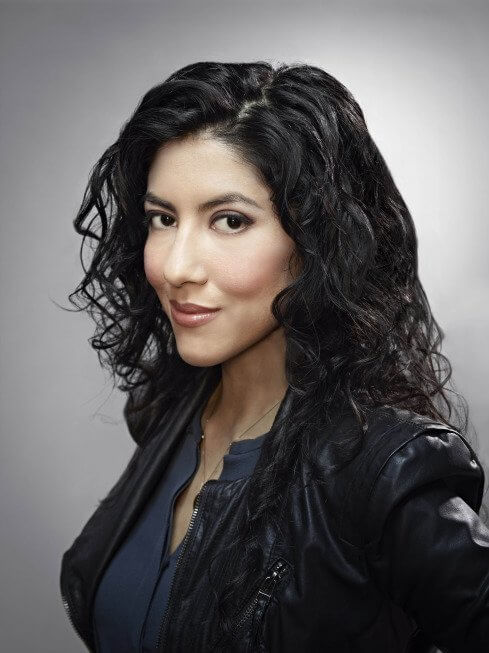

brooklyn nine-nine
Brooklyn Nine-Nine’s Stephanie Beatriz Talks to DAME About Being the Resident Badass
And explains how Andy Samberg can be a feminist, even though he says "boob, fart, boobs.”
This article was made possible because of the generous support of DAME members. We urgently need your help to keep publishing. Will you contribute just $5 a month to support our journalism?
The determinedly unsmiling Detective Rosa Diaz, played by Stephanie Beatriz, is Brooklyn Nine-Nine’s overzealous bullshit detector, whether she’s berating a co-worker for her “spineless ass-kissing” or verbally sparring with Terry Crews’s Sergeant Jeffords, with deadpan-juvenile zingers like “You can drop your butt.” It’s par for the course for Beatriz’s character who cuts right to the chase no matter how much the truth hurts, and uses her high intimidation factor to coerce confessions from perpetrators as easily as she makes a co-worker reveal her secret Santa’s identity. And she is one of the reason’s this Fox show has evolved beyond an Andy Samberg vehicle into one of the most diverse ensemble sitcoms on primetime—featuring multiple Latina and Black characters, one of which (Andre Braugher’s Captain Holt) is gay—even earning a Golden Globe for Best Comedy during it’s debut season.
Beatriz, as you may imagine, is much less stern than her leather-jacket-wearing counterpart. The Los Angeles–based actress, who worked mostly in theater before landing this role, is getting ready to visit her boyfriend at the Oregon Shakespeare Festival, which is where they originally met while both performing in Othello. (When I comment on the romance of this origin story she retorts, “The not-great part is that I was playing a prostitute in that play, but whatever, it is classical Shakespeare.”) Beatriz talked with DAME about being on a cop show in the wake of Ferguson, and reveals why Brooklyn Nine-Nine is actually a feminist show.

[laughs] Yeah, Rosa’s very different than I am. I’m sort of a socially inept and awkward person most of the time. And at the base of her core personality though I think she’s pretty socially inept too. She just puts on a very big armor.
I went to see a play recently called The Great Society about the Civil Rights movement. After the second act, this lady sits down next to me and is like, “I’m moving ’cause that black woman up there was talking through the entire second act.” [Makes gasping sound] For a second I was like, What do I do? ’Cause obviously it was important to her to point out that it was a black woman—that was her problem. And I said, “Great, I’m gonna take your seat.” I went up there and I introduced myself to the “black” woman and her husband and I told them what had happened. She started laughing and said, “No, we only started talking at intermission about how we remember when this happened and how sad it is that it’s still happening.” She brought up Ferguson and we had this really interesting dialogue about how the play is hard to watch because it makes you feel like, Am I responsible for my fellow man’s inability to feel equal in our society? And the responsibility does lie on us. I think for some people it’s too hard to get involved and that’s why that woman had to move. That is an example of something I would never have done before playing this role. Rosa doesn’t suffer fools, and in my own life, I think, Do I want to be the person that sits here and listens to this weird, racist comment, or do I want to be the person that starts a dialogue with other people about what’s going on in our world?
I don’t know if it will affect the audience because that’s so real and we’re so, so fake. What we’re doing is a break from reality in which cops have a lot of time on their hands to screw around whereas the real cops that I’ve met from doing the show, those guys are slammed 24/7 and risking their lives constantly. We did some tactical training this year and the guys were showing us how to clear doors and Andre kept saying, “But you’re leaving your back open,” or “You’re leading with your arms, can’t they shoot you?” And they kept saying, “Well yes, Andre, you’re never going to be fully covered.” That being said, Ferguson is such a horrible, delicate situation and it’s not an isolated situation. There’s a lot of hate flying around. I can definitely see how someone would be like, “Uh, no, I’m not into anything cops right now.”
It’s so crazy women aren’t allowed to be abrasive in films or television and be liked, there’s still so much inequality in what we’re watching and reading. I think Rosa really speaks to where television audiences are at right now; they want characters like her. You think about something like Game of Thrones and one of the most exciting episodes last season was when Brienne of Tarth had that epic hand-to-hand battle scene with the Hound. It was so exciting to see her kick his ass. Audiences are ready for their female characters to be portrayed just like the men are portrayed, meaning all the different kinds of characters men are allowed to play.
It’s so weird that you say that because I literally said that to Andy [Samberg] the other day. I was like, “I really appreciate your feminist viewpoint on the script and what we’re doing.” Even though his character says stupid stuff like “boobs fart boobs,” he’s still a feminist, he sees his female partners as equals, and when he doesn’t he’s willing to learn about why he’s wrong. It comes from the top down, [show creators] Mike Schur and Dan Goor are both really smart guys and, I think, feminists. They want to see characters portrayed on television that are realistic to them and what looked more realistic to them is characters that operate as feminists.
It’s so exciting that if I was a kid right now I could turn on the TV and see a bunch of different people that look like me. I never would’ve seen someone who was Latino in a commercial for a phone, or a family vacation to Universal Studios. It’s great, because whether or not you’re conscious of it, you take that in and go, How does the world see me? What are the parameters of how I can live my life?
Oh girl…
Everything still feels totally normal including sadly, still getting acne. I really did think like, oh, some celebrity fairy will just come and wave her magic wand and then everything will be different once I’m on a show. No, it’s still all the same shit because at the end of the day, if you don’t wear deodorant you stink.
I do a little bit, especially with the acne. I was like, well, now people are going to be looking at photos like, Does she have any zits this week? But, god, what a nice thing to be able to tell young women, like, this is not your responsibility to live up to some weird standard that was in place before you were even born. You don’t have to compare yourself to celebrities because those people are living in an alternate reality—there are lights and setup and they rub your zit out of the shot. So sharing that was a cool way to reach out and say the stuff that we’re looking at—in magazines, on television, in the media—it’s not really real.
Before you go, we hope you’ll consider supporting DAME’s journalism.
Today, just tiny number of corporations and billionaire owners are in control the news we watch and read. That influence shapes our culture and our understanding of the world. But at DAME, we serve as a counterbalance by doing things differently. We’re reader funded, which means our only agenda is to serve our readers. No both sides, no false equivalencies, no billionaire interests. Just our mission to publish the information and reporting that help you navigate the most complex issues we face.
But to keep publishing, stay independent and paywall free for all, we urgently need more support. During our Spring Membership drive, we hope you’ll join the community helping to build a more equitable media landscape with a monthly membership of just $5.00 per month or one-time gift in any amount.




















































































